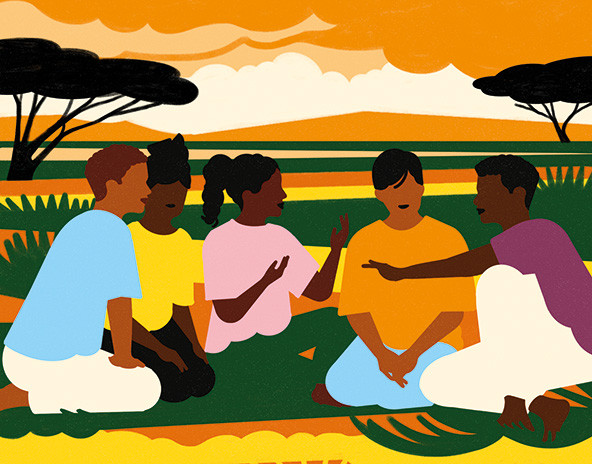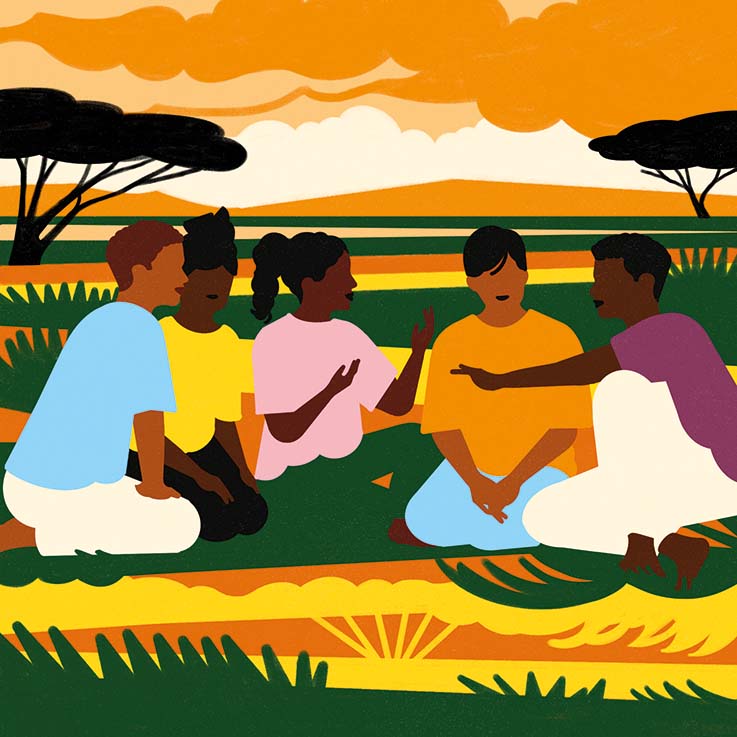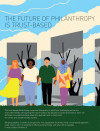
(Illustration by Andrea Mongia)
I used to be born in apartheid South Africa, the place racism and injustice outlined society. The nation’s white minority used its energy to construct methods and buildings to divide and oppress individuals. Inequity was throughout us. Whereas this historical past nonetheless looms over the nation, South Africa shouldn’t be alone. Historic inequities have formed each society, each sector, our modern lives, and our organizations. Philanthropy isn’t any exception. I based the Charlize Theron Africa Outreach Challenge (CTAOP) due to the lasting impression of inequity on younger individuals and their communities. The longer we do that, the extra we notice that typical philanthropy, like many different sectors, retains energy the place it’s. — Charlize Theron
The Way forward for Philanthropy Is Belief-Primarily based
The trust-based philanthropy motion has grown in fast time, however there are nonetheless fundamental misunderstandings about this method and its daring imaginative and prescient for a extra simply and democratic society. This complement illustrates what a trust-based method actually means, why it’s important to efficient philanthropy, and what shall be potential if extra funders embrace it. Sponsored by the Belief-Primarily based Philanthropy Challenge
As funders, if we’re to attain our shared imaginative and prescient with our grantee companions, we have to construct an atmosphere with sturdy relationships, the place every of us takes duty for our function. Too typically this isn’t the case. Our mission at CTAOP is to spend money on and advance the well being of younger individuals in southern Africa to create a extra equitable future for all. We obtain this by forming shut bonds with our program companions, which requires each belief and accountability. It’s our perception that by these relationships we will greatest help neighborhood leaders to create constructive change within the lives of younger individuals.
By defining accountability as taking duty for our actions, we will suppose critically in regards to the function we play in a bigger ecosystem of change. Whereas we perceive that every funder operates in distinctive contexts and with limitations that form their method, our hope is that this text encourages them to suppose extra with an fairness lens, particularly because it pertains to their very own accountability.
From Management to Accountability
In philanthropy, accountability is a observe typically required solely of the grantee, and grant makers typically cross on any accountability necessities to their neighborhood companions. Many funders require burdensome proof of numbers reached and accomplished actions, quarterly impression, or detailed monetary audits. Such knowledge are sometimes extra about compliance with funders’ necessities than studying about neighborhood impression. Funding and technique selections not based mostly on studying might subsequently be based mostly on biases formed by non-local norms. People with related lived experiences are sometimes labeled solely “beneficiaries” or “recipients,” whereas others who possess better positional energy are deemed “consultants” or “authorities” greatest suited to resolve societal challenges.
Some indicators may be useful for studying about our companions’ work. But when we’re sincere with ourselves, philanthropy’s typical accountability practices typically extra carefully resemble a complete audit. Very not often does a funder’s measurement of impression embrace any reflection on or analysis of their very own function in reaching the shared objective. Fairly the main focus is on judgment of the neighborhood companions’ work. Past receiving occasional suggestions, few funders actually construct mutual accountability—what we outline as an agreed-upon course of for each funders and grantee companions to be held accountable—into their work.
Nonprofits are conditioned to view accountability by a equally tinted compliance lens. They have to play by the principles of the philanthropic recreation, conforming to funder necessities ceaselessly on the expense of their work and the communities they serve to obtain funding. “Given the restricted quantity of funding obtainable, grantees like [us] typically haven’t any alternative however to simply accept funding from donors,” one CTAOP program companion explains, “even when our expertise, values, and fervour aren’t acknowledged or acknowledged.”
CTAOP has at all times prioritized care and responsiveness, an method that’s mirrored in how we honor the experience and experiences of youth and our program companions.
The chance that belief erodes between organizations and the communities they serve will increase when funders make unilateral selections about knowledge assortment, impose views that solely symbolize the International North, or demand that organizations perform what funders deem “evidence-based” programming as a result of funder necessities might power organizations to push apart native wants or compromise cultural norms. Neighborhood-based organizations can not perform significant work when communities lose belief within the organizations that serve them.
As funders, we should sharpen our evaluation of accountability and energy inside our organizations once we assess impression as an alternative of solely specializing in unhelpful metrics imposed upon grantees.
An Allyship Method
Like many funders, we depend on the management of native changemakers to advance our mission as a grant maker. Our program companions know the nuances of societal inequities they expertise. They see how seemingly disparate points are interconnected, which levers to drag to make change, and methods to navigate the native community.
This ethos has been integral to our work from the start. When Charlize Theron based the group, she was pushed by the ability and fervour of younger individuals in South Africa and a need to offer the respect and area that society not often affords them. Mobilizing sources was an necessary piece of CTAOP’s function, however we knew that how
sources are deployed was simply as necessary. Whereas we increase cash and supply multiyear, versatile, long-term funding and capacity-strengthening help, we work along with youth leaders and neighborhood organizations to make sure that we’re centering the younger individuals and communities.
CTAOP has at all times prioritized care and responsiveness, an method that’s mirrored in how we honor the experience and experiences of youth and our program companions. We construct relationships rooted in allyship and self-accountability by sharing our dedication to them firstly of our relationship after which holding ourselves accountable by soliciting nameless suggestions about our help for our program companions. Relationships are much less transactional and extra private—other than one annual check-in, program companions attain out as little or as a lot as they’d like. All present companions join extra typically than the check-in to share what’s significant to them. Whereas we will’t at all times meet everybody’s wants, studying helps us proactively and reactively deploy no matter sources we have now in help of our shared objectives. Our annual summit emerged from this allyship method, and it has develop into probably the most priceless help CTAOP supplies outdoors of core grants. We host a number of employees from all program companions in an area devoted to their well being and well-being, the place they’ll strengthen abilities and join with each other, and unleash their collective energy and creativity and return to work rejuvenated.
Reimagining accountability requires self-examination, humility, curiosity, and a willingness to alter. A part of our journey has included confronting the ability imbalances inherent in conventional philanthropy—particularly in grantmaking from the International North to the International South. Fairly than being acknowledged for his or her management, experience, and knowledge, communities working for native change are sometimes portrayed as victims or in want of support. Inside this context, grant makers working throughout geographies have a duty to work towards decolonization. A number of organizations are reimagining conventional organizational buildings, akin to OneVillage Companions, which has shifted from providing community-led applications to turning into a community-led group, with plans to maneuver from the present management construction to at least one the place Sierra Leoneans outline and lead the group’s technique, operations, and programming. Within the areas we maintain—from our one-to-one relationships to advocacy efforts to the design of our summits—CTAOP sees our function as facilitators and true companions in studying and motion. We’re there to assist increase and transfer sources to the place our companions decide it’s wanted.
Mirror and Act
Appearing as a trust-based, accountable funder means recognizing that we are going to often misstep—we might even inadvertently trigger hurt. Though our program companions inform our processes and have largely formed CTAOP’s concept of change, we typically unintentionally revert to standard practices that reinforce management and compliance.
It’s time to substitute the outdated story about accountability—one which locations the burden on the neighborhood companion—with new norms and practices rooted in belief and mutuality.
For instance, we modeled our preliminary reporting course of on typical funder questions and size. In our quest to be complete and inclusive of the assorted applications, we required reporting numbers on 10 varieties of actions, numbers of individuals in every exercise (each new and recurring), numbers of youth receiving particular companies, and descriptions of every exercise and inhabitants. We additionally requested open-ended questions on successes and challenges and requested why they have been profitable and what plans there have been to beat challenges. These semiannual experiences have been burdensome to our companions and took priceless time away from their work. We spent hours gathering “overdue” experiences and much more reviewing them and asking follow-up questions, to which they needed to reply in writing. The method consumed everybody’s power, delayed grant renewals, and bolstered the dangerous funder-nonprofit dynamics we sought to keep away from.
Our shortcomings didn’t go unnoticed. However admitting our failures and exhibiting vulnerability opened the door to candid suggestions from companions, together with, “Yeah, your reporting sucks.” True accountability meant that we needed to be open to sincere suggestions and make changes collaboratively. The outcome was a much less burdensome and extra significant system to share the learnings that inform our work.
Our plans for the longer term embrace working with our companions to ascertain shared objectives knowledgeable by their experience and expertise. This highway map, created collectively, will enable us to strengthen our dedication to accountability. It can additionally make clear how we would alter or shift methods to raised assist our companions obtain our collective imaginative and prescient. Whether or not we face a problem, testing our assumptions, or looking for to study extra, we have now discovered that participating our program companions as teammates and thought companions not solely aligns with our values, but additionally produces a greater end in service of the mission.
The Duty to Construct One thing Higher
Our companions on the entrance strains of change have been unfairly burdened by philanthropy’s draconian method to accountability. It’s time to substitute the outdated story about accountability—one which locations the burden on the neighborhood companion—with new norms and practices rooted in belief and mutuality. Within the phrases of one in all our earliest program companions, with belief got here “outcomes we didn’t think about potential. A serious lesson for organizations like ours is that we even have to remodel ourselves if we’re to embrace all of the magic that may be conjured when two entities collaborate on the idea of belief.”
Within the Japanese Cape of South Africa, we have now seen a program companion’s mental-health screening concept end in widespread adoption by the provincial authorities. We’ve witnessed complicated and important well being details about anti-retroviral treatment (ARVs) communicated to rural Xhosa communities rooted in oral tradition by native track and dance. And we have now supported the transformation of greater than 40 delivery containers into photo voltaic web cafés throughout Gauteng and KwaZulu-Natal provinces, offering secure areas for younger girls and ladies to entry sexual and reproductive well being info and applications tailor-made to satisfy their wants. These examples emerged from program companions taking the lead and CTAOP listening and responding with help.
Now greater than ever, we want the management, imaginative and prescient, and brilliance of our nonprofit companions. A extra equitable, simply method to accountability is prime to supporting them. When funders relinquish management and take duty for a way we present up, we will domesticate relationships that unleash daring options.
Assist SSIR’s protection of cross-sector options to world challenges.
Assist us additional the attain of revolutionary concepts. Donate at this time.
Learn extra tales by Lorrie Truthful Allen, Ashlee George & Charlize Theron.

